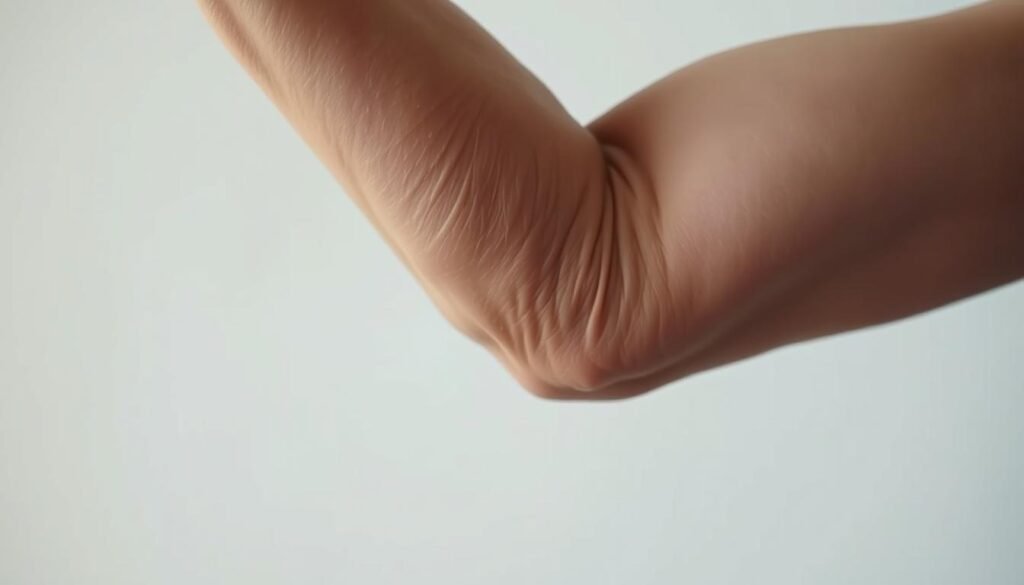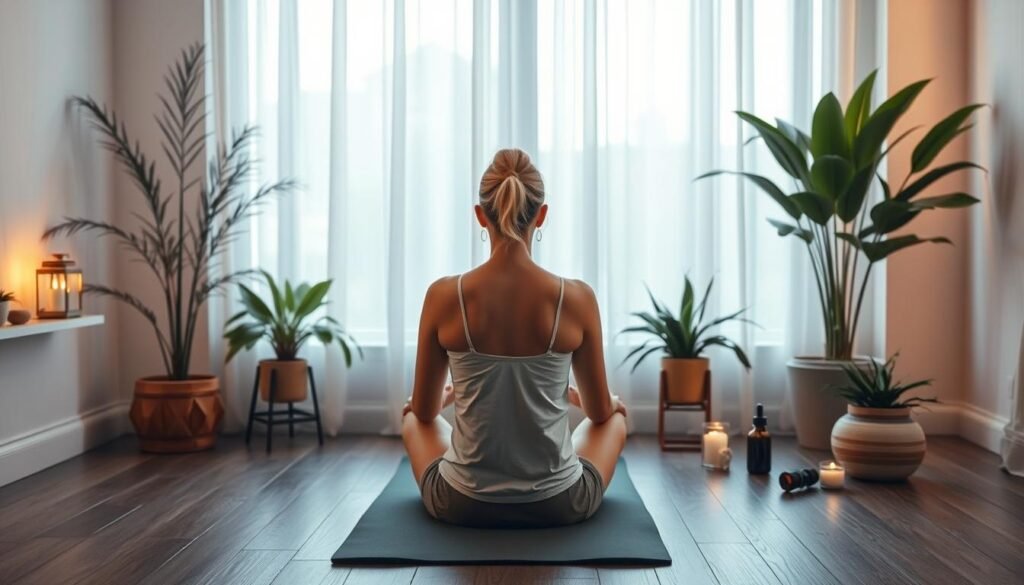Did you know muscle twitches are very common? Most people experience them at different times in their lives. These twitches, or fasciculations, can come from anxiety. Anxiety doesn’t just affect how we feel mentally but also physically. When anxiety causes muscle twitching, it can disrupt daily life and even sleeping patterns. This article offers expert advice and steps to tackle anxiety muscle twitching. It highlights ways to ease anxiety naturally and regain control over your body.
Key Takeaways
- Muscle twitches can affect any muscle in the body, often occurring alongside anxiety.
- Anxiety twitching commonly worsens during periods of high stress and may improve with effective anxiety management.
- Common symptoms of anxiety twitching include intermittent muscle contractions, notably in the calf and eye muscles.
- Providing a healthy lifestyle and managing stress can contribute to alleviating anxiety muscle twitching.
- If muscle twitching interferes with daily life or sleep, it’s essential to consult a healthcare provider.
Understanding Anxiety Muscle Twitching
When you feel anxious, you might notice your muscles twitching. This can happen in your face, arms, and legs. Stress makes your nervous system release certain chemicals. These chemicals make your muscles move on their own. You might see these twitches often or just sometimes, especially when you’re more stressed.
Dealing with anxiety can actually help stop these twitches. Doing exercises often makes you feel better overall. It can really help lower signs of anxiety. Eating right and drinking enough water is also important. It keeps your muscles working well and can reduce twitching. Not getting enough sleep can make anxiety worse. This leads to more muscle spasms. But deep breathing techniques can lower your stress. This is good for calming those muscle twitches.
Caffeine can make anxiety and twitching worse. Drinking less caffeine might help reduce twitching. Writing in a journal can help you deal with your feelings. This can lower your stress and might stop the twitches.
Understanding muscle twitching means seeing how it links to anxiety. By changing your lifestyle and handling stress better, you can lessen anxiety-related symptoms. This improves how you feel each day.
What Causes Muscle Twitching?
Muscle twitching comes from various factors. Stress is a big cause, as it leads to too much muscle use. The adrenal glands release stress hormones like adrenaline in response to anxiety. This can cause muscles to twitch without control.
Triggers for anxiety twitching include:
- High caffeine intake
- Poor sleep quality
- Dehydration
- Nutritional deficiencies, especially in vitamins and minerals
In 2019, a study found that rehydrating too quickly after being dehydrated can cause muscle cramps. This happens because of sudden changes in electrolyte levels. Also, not getting enough sleep can make your eyelids twitch, according to the American Academy of Ophthalmology.
Too much vitamin B6 can also be bad, leading to muscle twitches and weakness. Some illnesses make twitching worse. For instance, ALS and MS are known to cause muscle twitching. Pinched nerves in the spine can also cause muscle spasms, often in the legs or feet.
In short, benign fasciculation syndrome often leads to muscle contractions without serious problems. But if muscle twitching keeps happening and is paired with weakness or changes in feeling, it’s important to see a doctor.
Impact of Stress on Muscle Twitches
Stress has a big impact on the body, especially on stress effects on muscle twitching. It puts the body on high alert. This “fight or flight” response can make muscles tense due to anxiety. This tension can lead to involuntary muscle movements and twitches.
Chronic stress makes this worse, causing a cycle of anxiety and twitching. As muscles stay tense, twitches become more likely. Fatigue, lacking nutrients, and consuming stimulants can increase stress responses, leading to more twitching.
People might notice twitches, like in the eyelid or limbs, during stressful times or with anxiety disorders. Constant anxiety may cause twitching all over the body. This can disrupt daily life and lower life quality.
Using stress-reducing techniques can help lessen muscle tension due to anxiety and twitching. Deep breathing, yoga, and mindfulness are effective. Also, eating foods high in calcium and magnesium supports muscle health and helps prevent twitches.
To better manage stress, adding stress management techniques into your daily routine is helpful. Tackling stress head-on improves emotional wellbeing and lessens muscle twitching.
What Are the Symptoms of Anxiety-Induced Muscle Twitching?
Noticing muscle twitches because of anxiety is key. This symptom shows up as involuntary contractions in different muscles. You might feel it in your eyelids, calves, arms, or neck. These twitches can surprise you and might make you feel more anxious.
Here’s what to look out for with anxiety muscle twitching:
- Involuntary muscle contractions that don’t hurt but bother you.
- Feeling twitches in places like your eyelids, hands, and legs.
- Feeling jittery and anxious, especially when twitching happens.
- Not sleeping well, which could make the twitching worse.
Lack of sleep and too much caffeine are common causes. Not getting enough nutrients, not drinking enough water, and hormone changes can also make it worse. If you notice these twitches, it could be a sign you need to check with a doctor.
- Common signs of this problem include:
- Spasms in different parts of your body
- Being really aware of your twitches
- Feeling anxious and unable to relax
- Twitches that bug you but don’t hurt

Talking to someone, changing your routine, and managing stress can make a big difference. Knowing about anxiety and muscle twitching helps you get the right help. This can make you feel better overall.
How to Stop Anxiety Muscle Twitching
Anxiety muscle twitching can be really annoying. But, there are good ways to fight it. Pay attention to what causes it, try relaxing exercises, and live healthily. This can make a big difference. It helps in controlling muscle jerks and cuts down anxiety.
Identify and Address Triggers
Finding out what causes your anxiety muscle twitching is very important. Some common causes are:
- Caffeine boosts anxiety symptoms.
- Not getting enough sleep raises stress and cortisol.
- Not having enough magnesium and calcium.
- Being dehydrated, affecting how nerves work.
- Changes in hormones that might alter muscle control.
Once you know these triggers, you can avoid them. This helps control muscle twitching.
Practice Relaxation Techniques
Using relaxation methods is very helpful. Trying out progressive muscle relaxation, deep breathing, and meditation can decrease anxiety. They bring peace. Doing these regularly helps control anxiety better and lessens twitching.
Maintain a Healthy Lifestyle
Living well is crucial for managing symptoms. You should:
- Exercise regularly for better health.
- Eat a diet full of important nutrients, especially magnesium and vitamin B.
- Drink enough water for nerve health.
- Get good sleep for rest.
Doing all these not only stops muscle twitching but also boosts mental health. It makes you stronger against anxiety.
| Trigger | Impact on Muscle Twitching | Management Strategies |
|---|---|---|
| Caffeine | Makes anxiety worse | Limit intake |
| Lack of Sleep | Raises cortisol, causing spasms | Improve sleep hygiene |
| Nutritional Deficiencies | Leads to twitching by affecting nerves | Eat a balanced diet |
| Dehydration | Affects nerve function | Stay hydrated |
Managing Muscle Spasms Effectively
Muscle spasms can feel like a twitch or a knot and can be very painful. They mostly happen in the legs and can last from a few seconds to 15 minutes. Knowing how to manage muscle spasms is important if you often feel this discomfort.
First, find out what causes your muscle spasms. Not drinking enough water, low electrolyte levels, and stress can lead to spasms. To handle this, drink plenty of water and know when to rest. For instance, doing light exercises before bed can prevent cramps at night. Also, using creams that reduce inflammation may help.
Some home remedies might not work for everyone. But, many people say drinking pickle juice can stop cramps in about 30 to 35 seconds. It’s also important to see a doctor if the spasms keep happening. This could mean there’s a bigger health issue.
Being overweight, pregnant, or an athlete can increase the chance of having spasms. Doing regular stretches and warming up before workouts can help lower the risk. Cooling down after exercising is also helpful.

If muscle spasms do not go away, a doctor may suggest muscle relaxants for a short time. Keeping track of how much water you drink and trying natural relaxants like chamomile tea can also help manage spasms well.
| Prevention Strategies | Potential Benefits |
|---|---|
| Increased Water Intake | Helps prevent dehydration-related spasms |
| Gentle Stretching | Reduces muscle tension and prevents cramps |
| Proper Warm-up/Cool-down | Enhances muscle flexibility and recovery |
| Topical Treatments | Provides immediate relief from pain |
| Pickle Juice | Quick relief from muscle cramps |
Using these methods can make a big difference in handling muscle spasms and improving physical comfort. For more help with muscle issues caused by anxiety, check out effective coping techniques that meet your personal needs.
Calming Anxiety Naturally
Calming anxiety naturally involves a multifaceted approach. Dietary choices and staying hydrated play key roles. Incorporating certain foods and keeping hydrated can greatly influence our response to stress and anxiety.
Recognizing these factors can help lessen symptoms like muscle twitching often linked with anxiety.
Nutrition Tips for Reducing Twitching
To tackle anxiety-induced muscle twitching, follow these nutrition tips:
- Incorporate leafy greens, packed with essential vitamins and minerals.
- Focus on whole grains for sustained energy and overall health.
- Include lean protein sources like chicken, fish, and legumes for vital amino acids.
- Stay mindful of antioxidants in fruits and vegetables to fight oxidative stress.
- Consider using calming herbs like chamomile.
Hydration and Its Importance
Hydration plays a critical role in muscle function. Drinking enough water can boost muscle performance and reduce twitching. Aim to:
- Drink at least 8 glasses of water daily, adjust for exercise and climate.
- Limit caffeine and alcohol to avoid dehydration.
- Opt for hydrating foods like cucumbers, oranges, and watermelon.
Prioritizing hydration helps with muscle function and overall health. It’s key in calming anxiety naturally. For those with anxiety-induced tremors, understanding muscle function and hydration is crucial. For more insight, consider reading this article.
Mindfulness for Anxiety Twitches
Practicing mindfulness can greatly help with anxiety-linked muscle twitches. By focusing on the now, people feel more connected to their body sensations, which lowers tension. Deep breathing or meditation aids in relaxation and self-awareness, leading to a calm mind.
This approach helps people watch their thoughts and emotions without judgment. This is key for better emotional control.
Using mindfulness to lower stress is very effective. Adding mindfulness exercises regularly can decrease symptoms of anxiety, like twitching. Some helpful mindfulness methods are:
- Body scan meditations to boost awareness of bodily feelings.
- Focused breathing exercises to soothe the nervous system.
- Mindful walking practices that merge movement with conscious awareness.
Studies show that mindfulness can ease anxiety symptoms’ severity. Many find they feel more peaceful and less sensitive to stressors after practicing regularly. Keeping a journal on thoughts and emotions during mindfulness can improve the experience.

| Mindfulness Techniques | Benefits |
|---|---|
| Body Scan | Boosts awareness of bodily feelings, decreases muscle tension |
| Deep Breathing | Relaxes the nervous system, aids in relaxation |
| Mindful Walking | Blends movement with consciousness, improves focus |
Creating a daily mindfulness habit helps people manage anxiety and twitching more effectively. Taking up mindfulness not just betters emotional health but also gives a feeling of control during tense times.
Natural Remedies for Anxiety Twitches
Natural remedies for anxiety twitches can provide relief. They let people avoid the side effects of medications. Alternative strategies for muscle twitching are worth exploring.
- Herbal Supplements: Chamomile and valerian root are known for their calming effects, potentially aiding relaxation and reducing anxiety muscle twitching.
- Aromatherapy: Utilizing essential oils, such as lavender, can create a soothing environment, helping to lessen the frequency of tics.
- Exercise: Regular physical activity can relieve stress and provide an outlet for muscle tension. This may, in turn, reduce anxiety-related symptoms.
- Massage Therapy: Engaging in deep tissue massages from qualified therapists may alleviate muscle stress, promoting overall comfort and relaxation.
- Dietary Choices: Foods rich in antioxidants, like blueberries, and those aiding muscle recovery, such as cherries and pomegranate juice, contribute positively to muscle health.
Always remember, these natural methods should support, not replace, medical advice. Before starting new treatments, talk to a healthcare pro. This ensures safety and success.
| Natural Remedies | Benefits |
|---|---|
| Chamomile | Promotes relaxation and reduces anxiety. |
| Valerian Root | Aids in sleep and calms muscle tension. |
| Lavender Oil | Creates a calming atmosphere to reduce twitching. |
| Blueberries | Offers anti-inflammatory effects that may help reduce muscle spasms. |
| Pomegranate Juice | Facilitates faster muscle recovery post-exercise. |
Natural remedies for anxiety twitches can bring better comfort and peace. Using a holistic approach treats symptoms and the anxiety causing them.
Conclusion
Stopping anxiety muscle twitching takes understanding its causes and using effective strategies. It involves more than just handling the twitching itself. It’s about looking at the whole picture of anxiety.
To ease anxiety, changing your lifestyle, getting therapy, and trying natural solutions are crucial steps. Keeping hydrated, eating well, and practicing relaxation techniques are top tips. Remember, if muscle twitching doesn’t stop or gets worse, see a doctor. To learn more, check out articles on handling anxiety.
Mixing strategies for mental and physical health is vital. This way, you can manage anxiety better. And improve your life’s quality.